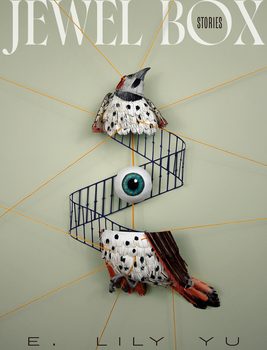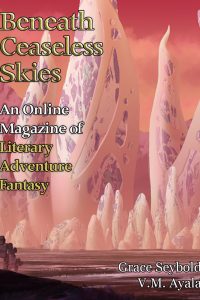Gary K. Wolfe Reviews Jewel Box: Stories by E. Lily Yu
 Jewel Box: Stories, E. Lily Yu (Erewhon 978-1-64566-048-4, $27.00, 326pp, hc) October 2023.
Jewel Box: Stories, E. Lily Yu (Erewhon 978-1-64566-048-4, $27.00, 326pp, hc) October 2023.
Jewel Box is both a perfectly appropriate and a slyly ironic title for E. Lily Yu’s first collection. Not surprisingly for anyone familiar with Yu’s work, many of the 22 stories are absolute gems, notable for their variety, clarity, and elegance – not to mention their length; they’re all true short stories rather than novelettes or novellas. Fully half of the reprints (four stories are original) have appeared in various “year’s best” collections. But a jewel box also suggests something a bit precious and decorative, and Yu’s stories are anything but that. The most famous story, the multiple-award-nominated “The Cartographer Wasps and the Anarchist Bees”, with its Chinese setting, may initially look a bit like a traditional animal fable, but it develops into a shrewd critique of oppression, colonialism, and resistance. The desperate poverty of a young girl after her grandmother dies in “The No-One Girl and the Flower of the Farther Shore” seems like it might be alleviated by her discovery of a magical flower, but it only leads to a wrenching betrayal. “Green Glass: A Love Story” is indeed a love story, but one set in a dying, poisoned future in which even an effort to make ice cream becomes a challenging quest. Another grim future shows up in “Local Stop on the Floating Train”, whose protagonist, on her way to the city to see a play, is victimized by a random racist and sexist encounter as the train passes through a “nuclear desert.”
So Yu’s jewels can be sharp-edged, but they can also be delightful, as with the two stories that lead off the collection. When the angel Gabriel offers to take a poor coffee-shop owner in Cairo on a pilgrimage to Mecca in “The Pilgrim and the Angel”, he finds the owner really wants to go to Miami to visit his son, who (of course) never calls. “The Lamp at the Turning” is a genuinely charming short piece about a streetlamp who falls in love with a young man who passes by daily. One of the stories original to the book, “Courtship Displays of the American Birder”, is another quiet love story, peppered with birding lore if rather slight in plot. The most inventive of the original tales is “The Cat’s Tale”, which introduces a trickster cat and even elements of Jack and the Beanstalk into a clever re-imagining of Chaucer’s “The Clerk’s Tale”, one of a few tales that riff on traditional sources which are familiar to me – and an example, I suppose, of what Barzak would call a transformation. “The Time Invariance of Snow” is a rich, almost experimental deconstruction and critique of Andersen’s “The Snow Queen”, while “Three Variations on a Theme of Imperial Attire” does much the same with “The Emperor’s New Clothes”. “Music for the Underworld” is a witty, satirical SF take on Orpheus and Eurydice, in which the version of Orpheus, a musician named Jiménez, favors playing the theremin and finds his quest plagued by algorithms and pop-up ads. “Ilse, Who Saw Clearly” is a memorable, Grimm-flavored tale set in a frozen mountain village in Germany, where all the residents except the title girl are duped by a traveler into exchanging their eyes for eyes made of ice – which of course melt in warmer weather.
However fanciful her settings and allusions, though, themes of injustice and betrayal are never too far from the surface of Yu’s fiction, and sometimes are the surface. “The Wretched and the Beautiful” one of her straight SF stories, echoes themes from her powerful novel On Fragile Waves. A flying saucer lands carrying a group of bedraggled aliens who quickly become a refugee problem – until a shipload of far more prosperous and attractive aliens arrives, declaring without evidence that the refugees are escaped criminals. It’s significant that the story is narrated in the unusual first-person plural: when the refugees are turned over, “all of us, warm and satisfied with our participation in history, turned off our televisions and went to work, or to pick up our children from soccer, or to the liquor store to gaze at top-shelf whiskey” – in other words, we’re all cheerfully complicit with the beautiful people. Yu’s most effective deployment of classic fantasy tropes is “The Witch of Orion Waste and the Boy Knight”. A young witch saves a cowardly knight from embarrassment by slaying his dragons for him, only to find herself thrown over as soon as the knight meets an attractive maiden. But it doesn’t take full-on treachery and betrayal to earn scorn in Yu’s moral world. “The Lion God and the Two Gates”, another original story, concerns an Assyrian judge whose equivocal and wishy-washy judgments on Earth come to haunt him in the afterlife. If some of these stories seem born in anger and fashioned to invite our own anger, it’s no accident. Yu is a pointedly passionate writer, at times veering toward the moralistic, and her fiction reminds us that dragons and spaceships and magical wasps aren’t necessarily avatars of escapism, but ways of focusing our attention. In short, here as in On Fragile Waves, Yu is not about to let us just look the other way, checking out those top-shelf whiskeys.
Gary K. Wolfe is Emeritus Professor of Humanities at Roosevelt University and a reviewer for Locus magazine since 1991. His reviews have been collected in Soundings (BSFA Award 2006; Hugo nominee), Bearings (Hugo nominee 2011), and Sightings (2011), and his Evaporating Genres: Essays on Fantastic Literature (Wesleyan) received the Locus Award in 2012. Earlier books include The Known and the Unknown: The Iconography of Science Fiction (Eaton Award, 1981), Harlan Ellison: The Edge of Forever (with Ellen Weil, 2002), and David Lindsay (1982). For the Library of America, he edited American Science Fiction: Nine Classic Novels of the 1950s in 2012, with a similar set for the 1960s forthcoming. He has received the Pilgrim Award from the Science Fiction Research Association, the Distinguished Scholarship Award from the International Association for the Fantastic in the Arts, and a Special World Fantasy Award for criticism. His 24-lecture series How Great Science Fiction Works appeared from The Great Courses in 2016. He has received six Hugo nominations, two for his reviews collections and four for The Coode Street Podcast, which he has co-hosted with Jonathan Strahan for more than 300 episodes. He lives in Chicago.
This review and more like it in the November 2023 issue of Locus.
 While you are here, please take a moment to support Locus with a one-time or recurring donation. We rely on reader donations to keep the magazine and site going, and would like to keep the site paywall free, but WE NEED YOUR FINANCIAL SUPPORT to continue quality coverage of the science fiction and fantasy field.
While you are here, please take a moment to support Locus with a one-time or recurring donation. We rely on reader donations to keep the magazine and site going, and would like to keep the site paywall free, but WE NEED YOUR FINANCIAL SUPPORT to continue quality coverage of the science fiction and fantasy field.
©Locus Magazine. Copyrighted material may not be republished without permission of LSFF.








